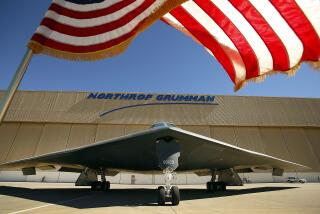Grumman Wants to Market Japanese Supercomputers
- Share via
Less than two weeks after trade negotiators signed a historic pact to boost sales of U.S. supercomputers in Japan, a major defense contractor said Monday that it wants to install Japanese machines in the United States and worldwide.
A spokesman for Bethpage, N.Y.-based Grumman Corp. said the company’s data systems division has been talking to all three Japanese supercomputer makers for several months in the hopes of becoming an authorized supplier of those systems in the United States and the Pacific Rim.
He said Grumman’s ongoing talks with NEC, Fujitsu and Hitachi are unrelated to the trade agreement signed late last month in which the Japanese pledged to make it easier for U.S. supercomputer makers to sell to the Japanese government.
But although the Grumman talks may not be linked to the trade pact, analysts said the aerospace contractor’s dealings point out a key, and much overlooked, aspect of the agreement: an increasing likelihood that Japanese supercomputer makers will benefit as much as, if not more than, their U.S. counterparts as trade barriers fall here and in Japan.
“The trade agreement could be the clear signal to U.S. purchasers that henceforth the government considers it a global market for supercomputers,” said Robert Reich, a professor of international economics at Harvard University’s Kennedy School of Government. “Now the signal is buy the best machine for the best price.”
But that hasn’t always been the signal, Reich noted.
Although trade negotiators in Washington and representatives of the American electronics industry have long complained that the Japanese market has been skewed against U.S. supercomputer makers, American manufacturers have sold nearly two dozen of their systems in Japan, including two to the Japanese government over the past decade.
However, Japanese manufacturers, which introduced their first machines only a few years ago, have sold just one in the United States, to a Houston research laboratory. A second potential sale to the Massachusetts Institute of Technology about 18 months ago was scrapped after U.S. government officials raised concerns.
“The United States has succeeded in keeping the Japanese out of its markets,” said Chris Willard, an analyst with Dataquest, a San Jose high-technology market research firm. “But if we get access to their territory, we can’t very well continue to keep them out of ours.”
Supercomputers, capable of performing millions of complex computations per second, are considered indispensable to research laboratories in both government and private industry, where they are used to predict weather patterns, aid space flights and design weapons, aircraft and cars.
Because of their sophistication, these machines are viewed in the global arena as key indicators of the evolving sophistication of computer electronics. At the Pentagon, the primary customer for American-made machines, these computers are treated as national resources critical to the nation’s defense.
With trade barriers in both countries relaxing, some analysts worry that the Japanese stand to post bigger gains since the United States is the largest market for these machines, and demand for Japanese-made machines has already been demonstrated.
As a leading defense contractor, Grumman’s data systems division has supplied the Pentagon with six supercomputers, all built by Cray Research, the Minneapolis manufacturer that pioneered the market more than a decade ago.
But, in Grumman’s view, the market is shifting and will soon require Japanese supercomputers.
“We see Japanese machines successfully entering the U.S. market in the next few years,” Curtis Orchard, vice president of Grumman International, a Grumman unit, told a news service in Tokyo. “There’s going to be a bit of reciprocity--it can’t be a protected market in the U.S.”
Orchard said a Japanese company would announce a supercomputer sale in the United States in the next two months, adding that Grumman expects some 20 Japanese supercomputers to be sold in the United States over the next four years. He said Grumman wants to be one of the companies installing those machines.
A spokesman for Cray, which has sold about two-thirds of the world’s currently installed supercomputers, said the company is unfazed by the prospect of increased competition from Japanese suppliers.
“We’d have to be stupid and naive not to be aware of the possibility that the Japanese will have greater access to our markets,” he said. “But we wouldn’t have pushed so hard for this trade agreement if we didn’t think we could compete and win.”





